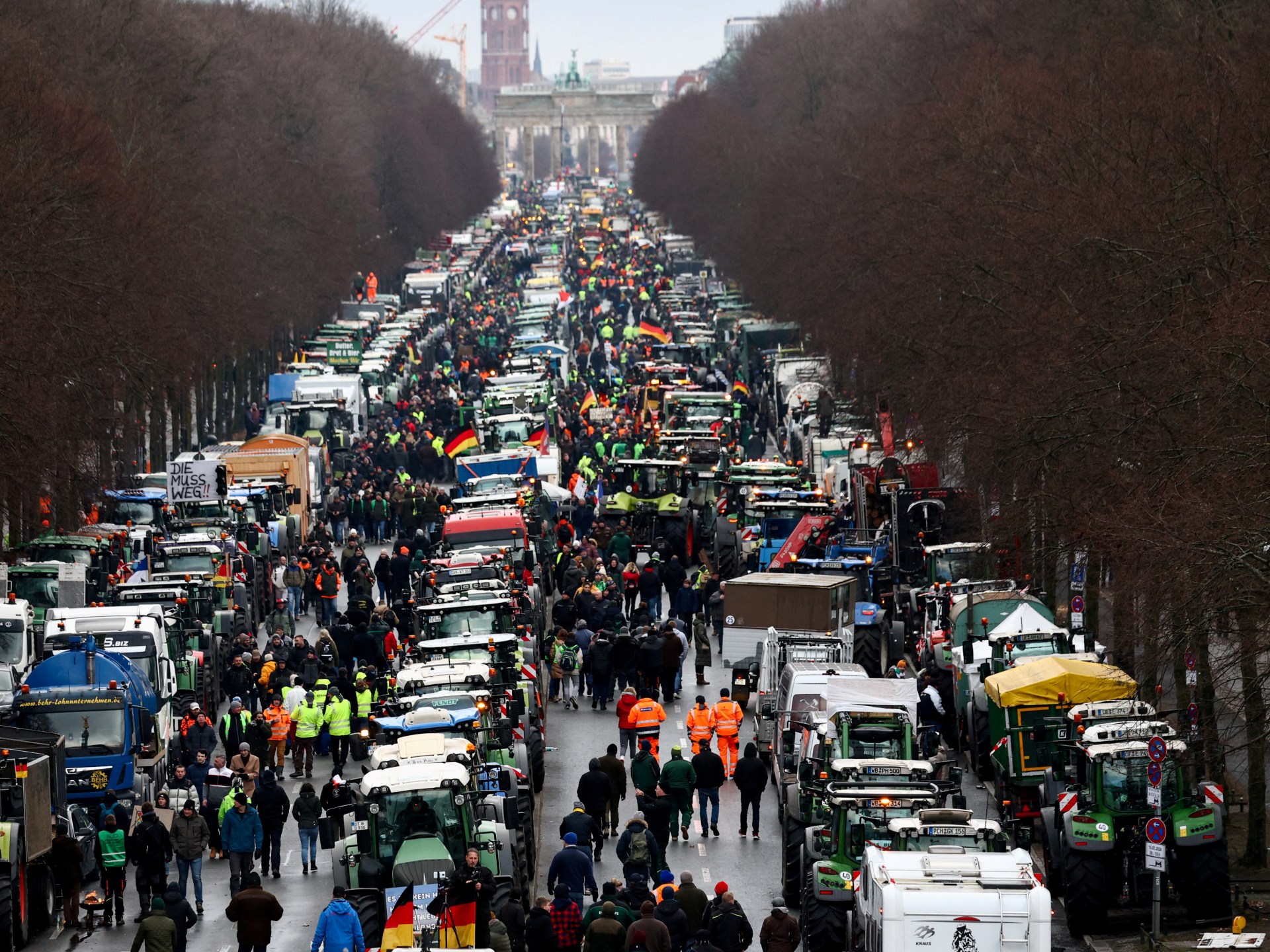Thousands of tractors block Berlin traffic over plans to end diesel subsidy

Farmers join a rally in the German capital demanding a rethink of the government’s plan to end fuel tax break.
Thousands of German farmers, truck drivers and agricultural workers have gathered with tractors and other heavy equipment in front of the Brandenburg Gate in central Berlin for a demonstration against the government’s plans to end tax breaks on diesel fuel.
Police estimated that at least 3,000 tractors had arrived for the protest on Monday and an estimated 2,000 more were on their way in a climax to weeklong protests.
The tractors blocked traffic in parts of the city and Berlin’s public transit agency reported major service delays. About 10,000 people had registered for the demonstrations against Chancellor Olaf Scholz’s plans to cut subsidies, but Berlin police expected more to attend.
A total of 1,300 police officers have been deployed to the protests, Berlin Police Chief Barbara Slowik told city leaders.
Finance Minister Christian Lindner addressed thousands of the protesting farmers and said there was no money for further subsidies.
“I can’t promise you more state aid from the federal budget,” Lindner told the crowd in front of the Brandenburg Gate.
“But we can fight together for you to enjoy more freedom and respect for your work.”
Farmers union head Joachim Rukwied, who had to take the microphone from Lindner and beg the crowd to stop booing him to hear what the minister was saying, said: “I have respect for every politician who is prepared to come to us.”
“The finance minister is here,” he said. “It makes no sense to boo him.”
Al Jazeera’s Dominic Kane, reporting from Berlin, said Linder’s comments at the protest were met with calls of “liar” and demands for new elections from the crowds.
“The farmers believe that the German community, the widespread community, supports them even though the centre of Berlin has dropped to a standstill,” he said.
“The question for the farming community now is do the protests stop today or will they go further,” he said.
Over the past week, farmers have blocked highway entrances and slowed down traffic across Germany as they expressed dissatisfaction with concessions the government has already made.
Berlin announced plans to cut subsidies and tax breaks on diesel and agricultural vehicles after a court ruling tore a multibillion-euro hole in the government’s budget, forcing Scholz’s coalition to find savings.
The government, which has partially walked back the plans, defended the reductions by pointing to increases in farmers’ incomes in recent years.
In the financial year 2022-23, farms made a record profit of 115,400 euros ($126,000) on average, a 45 percent increase on the year before, according to industry figures.
On January 4, the government said the tax exemption for farming vehicles would be retained and cuts in diesel tax breaks would be staggered over three years.
Scholz said in a video message on Saturday that “we took the farmers’ arguments to heart”, adding that he believes the government came up with “a good compromise”.
But the farmers with backing from the opposition conservatives and far-right parties said the government’s concessions do not go far enough.
“Farmers will die out,” farmer Karl-Wilhelm Kempner said on Sunday as he boarded a bus in Cologne to head to the demonstration.
“The population must understand that far more food will be imported” if subsidies are not restored.
Related
Turkish Airlines and Qatar Airways Suspend Mogadishu Flights Following US…
Home » Airlines News of Qatar » Turkish Airlines and Qatar Airways Suspend Mogadishu Flights Following US Embassy Terror Alert, Raising Security Concerns at
Local tourism destinations grow fast
Men sit at the Doha Corniche backdropped by high buildings in Doha on March 3, 2025. Photo by KARIM JAAFAR / AFP DOHA: Local tourism destinations are g
Hajj, Umrah service: Qatar Airways introduces off-airport check-in for pilgrims
Image credit: Supplied Qatar Airways has introduced an off-airport check-in
IAG, Qatar Airways, Riyadh Air, Turkish Airlines, Lufthansa & more…
Turkish Airlines – a Corporate Partner of the FTE Digital, Innovation & Startup Hub – is charting a course to rank among the top 3 global airlines for












